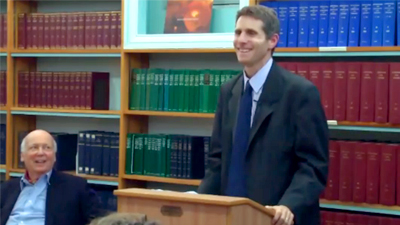Hersch Lauterpacht Memorial Lectures 2012, Part 1: 'The Concept of Jurisdiction and Admissibility in International Adjudication - A Theoretical Framework' by Professor Yuval Shany
Duration: 57 mins 1 sec
Share this media item:
Embed this media item:
Embed this media item:
About this item

| Description: |
The Hersch Lauterpacht Memorial Lecture is an annual lecture series given in Cambridge to commemorate the unique contribution to the development of international law of Sir Hersch Lauterpacht. These lectures are given annually by a person of eminence in the field of international law and a revised and expanded version of the lectures is usually published in the Hersch Lauterpacht Lecture Series by Cambridge University Press. The lecture comprises three parts, delivered on consecutive evenings, followed by a Q&A session on the fourth day.
The 2012 Hersch Lauterpacht Memorial Lecture, entitled 'Jurisdiction and Admissibility of Cases in International Courts and Tribunals' was delivered at the Lauterpacht Centre for International Law, University of Cambridge, by Professor Yuval Shany, Hersch Lauterpacht Chair of International Law, Hebrew University of Jerusalem from Tuesday 28th February to Friday 2nd March 2012. |
|---|
| Created: | 2012-03-05 12:31 |
|---|---|
| Collection: |
LCIL International Law Seminar Series MOVED
Cambridge Law: Public Lectures from the Faculty of Law MOVED |
| Publisher: | University of Cambridge |
| Copyright: | University of Cambridge |
| Language: | eng (English) |
| Keywords: | International Law; Admissibility; Jurisdiction; International Courts; Lauterpacht Centre for International Law; |
| Abstract: | Part 1 of 3: 'The Concept of Jurisdiction and Admissibility in International Adjudication - A Theoretical Framework'
Delivered by Professor Yuval Shany; chaired by Sir Elihu Lauterpacht CBE, QC Tuesday, 28 February 2012 This first lecture describes conferral of jurisdiction on an international court as a policy choice made by international law makers, as well as by the disputing parties, to channel certain disputes and problems to law-based avenues, at the expense of power-based diplomacy. Viewed as the product of a conscious decision by international actors, jurisdiction can be explained as a form of delegation whose legitimacy emanates from consent by a relevant set of constituencies, as well as from the relationship to the legal regimes that international courts serve. Still, delegation and consent also impose constraints on the power of international courts, as well as on their effectiveness and legitimacy – reflected in jurisdictional and admissibility challenges raised by parties to litigation (i.e., challenges against the very existence of power by an international court v. the manner in which power is to be applied). The empowering and constraining aspects of jurisdictional and admissibility rules, often place international judges in a conflict between competing sets of community expectations – a conflict further complicated by the independent institutional interests of international courts that may pull in yet another direction. |
|---|---|
Available Formats
| Format | Quality | Bitrate | Size | |||
|---|---|---|---|---|---|---|
| MP3 | 44100 Hz | 125.01 kbits/sec | 52.21 MB | Listen | Download | |
| MP3 | 16000 Hz | 31.25 kbits/sec | 13.05 MB | Listen | Download | |
| Audio Interchange File Format (AIFF) | 1.34 Mbits/sec | 575.56 MB | Listen | Download | ||
| Audio Interchange File Format (AIFF) | 250.02 kbits/sec | 104.41 MB | Listen | Download | ||
| Advanced Audio Coding (AAC) | 44100 Hz | 126.38 kbits/sec | 52.78 MB | Listen | Download | |
| Advanced Audio Coding (AAC) | 16000 Hz | 31.81 kbits/sec | 13.29 MB | Listen | Download | |
| Auto * | (Allows browser to choose a format it supports) | |||||

